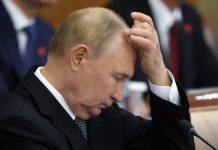As the escalation and confrontation between Russia and NATO rumbles on, Russia in a new threat warns that Poland will become a primary nuclear target if NATO nuclear weapons are deployed there.
What Has Happened?
The comments came after Polish President Andrzej Duda on Monday said his nation would be ready to host Western nukes, given Russia’s decision to station intercontinental ballistic missiles in neighbouring Belarus late last year.
‘Our patience is not limitless,’ Russian Deputy Foreign Minister Sergei Ryabkov said Thursday.

‘If Poland takes the path of further escalation – these verbal games with nuclear weapons – then it means there will be a further round of tension.
‘This game is very dangerous, and its consequences may be unpredictable.’
More Reactions
Kremlin press secretary Dmitry Peskov has also responded to Poland president’s declaration, stating that Russia’s defence ministry will ‘analyse the situation… and take all the necessary retaliatory steps to guarantee our safety’.

Amid the rising tensions, Belarus President Lukashenko has warned exchanging blows could lead to ‘apocalypse’.
Belarus Is Only Three Miles Away
Meanwhile, the Russian ally Belarus moved combat-ready troops closer to the border with Poland on Thursday ‘with a readiness of three hours’.
READ ALSO: Katie Price WARNED that her 16th boob job for ‘biggest breasts in Britain’ is ‘DANGEROUS’
Belarus made ready to meet Western forces with the decision to move an undisclosed number of troops south from Vitebsk Region in the north towards the southwest, where the country borders Poland and Ukraine.

Lukashenko claimed the decision was motivated by an intensifying threat to national security brought on by the war in Ukraine.
He claimed 120,000 Ukrainian troops were stationed along the shared border and argued that ‘Washington is doing everything to drag our country into the conflict’.
In December, he also confirmed Minsk was cooperating with Moscow to host Vladimir Putin‘s nuclear weapons as tension ratchet up between East and West.
The Kremlin justified the decision as a security response to perceived aggression by NATO amid its ongoing support for Ukraine.












